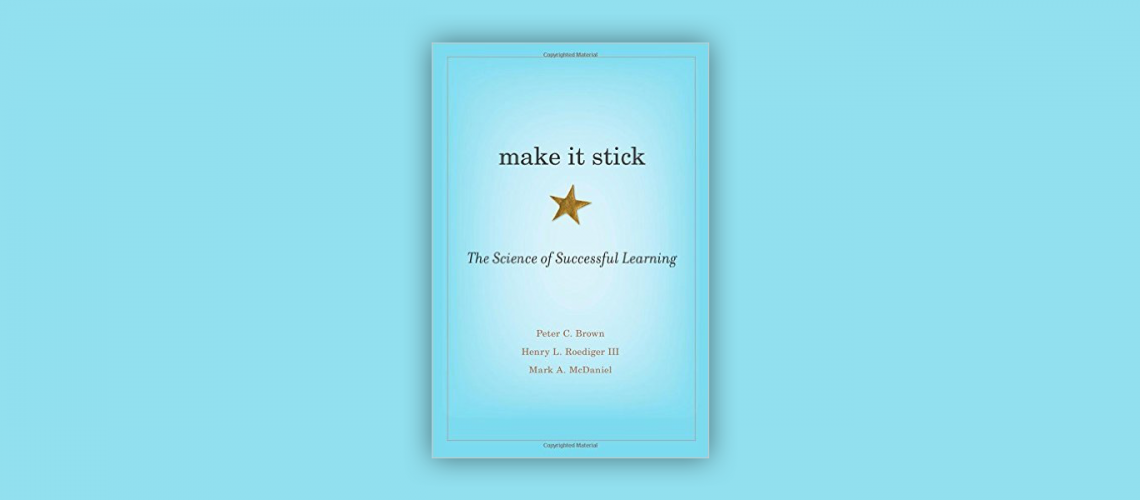“No matter what you may set your sights on doing or becoming…mastering the ability to learn will get you in the game and keep you there.”
Many common study habits and practice routines turn out to be counterproductive. Underlining and highlighting, rereading, cramming, and single-minded repetition of new skills create the illusion of mastery, but gains fade quickly.
More complex and durable learning come from self-testing, introducing certain difficulties in practice, waiting to re-study new material until a little forgetting has set in, and interleaving the practice of one skill or topic with another.
Speaking most urgently to students, teachers, trainers, and athletes, Make It Stick will appeal to all those interested in the challenge of lifelong learning and self-improvement.
Key Takeaways
“No matter what you may set your sights on doing or becoming…mastering the ability to learn will get you in the game and keep you there.”
To master the ability to learn, you need to upgrade your ineffective learning techniques. i.e. reading your notes before an exam. Popular learning methods like rereading are “learning illusions” that don’t lead to subject mastery
Three Learning Techniques
1. Self-Quizzing when you take a quiz, you’re more likely to make information stick because when you take a quiz you’re forced to dig into the depths of your knowledge to relieve information. The harder it is for you to recall new learning from memory, the greater the benefit of doing so.
“The effort of retrieving knowledge strengthens its staying power.”
We don’t need tow wait for someone to hand us a quiz. We can self-quiz. While learning, ask yourself:
- What are the key ideas?
- Which of the ideas are new to me?
- How can you use those ideas in your life?
Research shows, we forget 70% of what hear and read shortly after we learn it. Our minds are in a constant state of forgetting. When you self-quiz, you use the limited amount of information you can recall to navigate your way back to the information you’ve forgotten.
If learning were like exploring a new land, then self-quizzing would be like trying to retrace your steps back to the lake of knowledge. By putting in effort to find you way back to the knowledge you want to retain, you reset the forgetting curve and decrease your rate of forgetting.
2. Interleaving if you were learning Spanish and you were trying to learn a new Spanish phrase, should you try to repeat the phrase and perfect it before moving on to the next Spanish phrase? According to science, the answer is No.
If you want to learn and retain a new Spanish phrase, you should interleave similar phrases into your practice sessions. This would involve writing 5 Spanish phrases on 5 different flashcards. As you practice you go from flashcard to flashcard without repeating a single phrase. Your goal is to go from phrase to phrase in a random order until you can recall all 5 phrases perfectly.
By interleaving similar phrases, you force your brain to use extra effort to spot the similarities and differences between each of those phrases. Insta of focusing on one skill and trying to master that one skill before moving on to the next skill. Focus on three smilier skills and try to master all three as you switch between them.
3. Spacing spacing your repetitions is better than mass repetitions. Scientist call this the spacing effect. By spreading out the key ideas you’re trying to learn, you will retain the information more effectively.
Why? Rereading and mass repletion are too easy. The more you repeat in a single session, the more familiar it is and the less you struggle to remember it therefor the less you learn. Learning that’s easy is like writing in sand. Here today, gone tomorrow.
Self-quizzing is hard because you forget 70% of what you’ve listened to or read very quickly. Interleaving is hard because the brain has to work hard to decipher similar skills you’re practicing. Spacing is hard because if you allow enough time to pass, you get rusty and require effort to reconstruct an old concept or skill from memory.
The harder your brain has to work to retrieve information, the more likely it is to stick. Effort = Retention.


